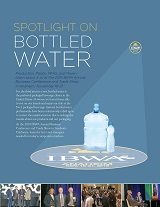“FLOW: For the Love of Water,” is a film that rightfully draws attention to the need for sustainable stewardship of our national and global water resources.
The 93-minute movie documentary presents to the audience a need for more responsible, science-based policies to govern community use, personal use, and industrial and commercial water use, while protecting and conserving Earth’s most critical resource.
The film, however, unfairly places blame on the bottled water industry. Agreeing with the allegations in “FLOW,” Knoxville News Sentinel movie critic Betsy Pickle said in her recent blog post:
[Bottled water companies] build their plants and pump water to sell for big profits, meanwhile wriggling out of paying taxes, polluting the nearby environment and pricing potable water out of the range of locals.First off, the bottled water industry pays taxes just like any other. No “wriggling out” there.
Next, it should be noted that all consumer products use water as an ingredient or in production, including foods and beverages. Furthermore, all industries that create a product cause some form of pollution during production and transportation – and the bottled water industry is on the low end of this lengthy list. (Get detailed facts here.)
Of all the users of water in America, bottled water production accounts for less than 2/100 of a percent (0.02%) of the total ground water withdrawn in the U.S. annually. While some bottled water companies use groundwater as the source, those companies further treat the water in a variety of ways – reverse osmosis, distillation, to name a few – before being bottled and sold to consumers.
What is also unclear in “FLOW” is the fact that bottled water companies are active in developing sound water management policies.
The industry actively supports comprehensive groundwater management practices that are science-based, treat all users equitably, are multi-jurisdictional and provide for future needs of this important resource.
And even though bottlers are a small ground water user, the industry has been instrumental in pushing states to develop comprehensive, science-based ground water management and sustainability regulations.
When there are times of drought or other water supply challenges, bottlers can adjust their water withdrawal to mitigate adverse impacts on a water resource. However, the industry is just one small piece of the puzzle and other water users must adopt the same protective measures to help ensure adequate resources for all.
Only then do we find the true answer to the problems addressed in “FLOW.”



























